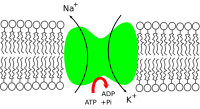
Photo from wikipedia
Increased sodium appetite is a physiological response to sodium deficiency; however, it has also been implicated in disease conditions such as congestive heart failure, kidney failure, and salt-sensitive hypertension. The… Click to show full abstract
Increased sodium appetite is a physiological response to sodium deficiency; however, it has also been implicated in disease conditions such as congestive heart failure, kidney failure, and salt-sensitive hypertension. The central nervous system is the major regulator of sodium appetite and intake behavior; however, the neural mechanisms underlying this behavior remain incompletely understood. Here, we investigated the involvement of the (pro)renin receptor (PRR), a component of the brain renin-angiotensin system, in the regulation of sodium intake in a neuron-specific PRR knockout (PRRKO) mouse model generated previously in our laboratory. Sodium intake following deoxycorticosterone (DOCA) stimulation was tested by assessing the preference of mice for 0.9% saline or regular water in single-animal metabolic cages. Blood pressure was monitored in conscious, freely moving mice by a telemetry system. We found that saline intake and total fluid intake were significantly reduced in PRRKO mice following DOCA treatment compared with that in wild-type (WT) mice, whereas regular water intake was similar between the genotypes. Sodium preference and total sodium intake were significantly reduced in PRRKO mice compared with WT mice. PRRKO mice also excreted less urine and urinary sodium compared with WT mice following DOCA treatment, whereas potassium excretion was similar between the two groups. Finally, we found that the sodium balance, calculated by subtracting urinary sodium excretion from sodium intake, was greater in WT mice than in PRRKO mice. Collectively, these findings suggest that the neuronal PRR plays a regulatory role in DOCA-induced sodium intake.
Journal Title: Physiological genomics
Year Published: 2018
Link to full text (if available)
Share on Social Media: Sign Up to like & get
recommendations!